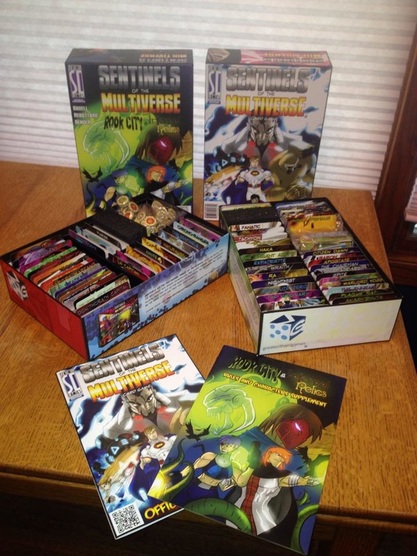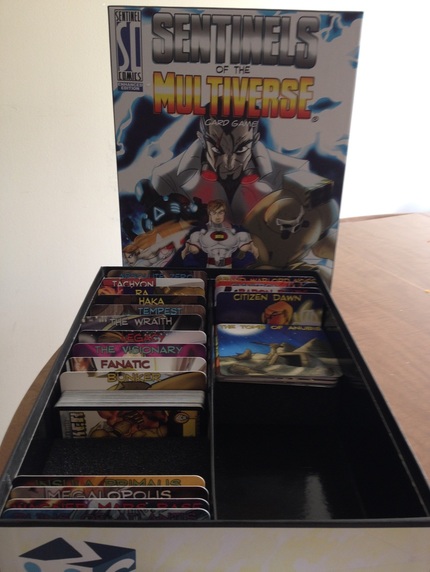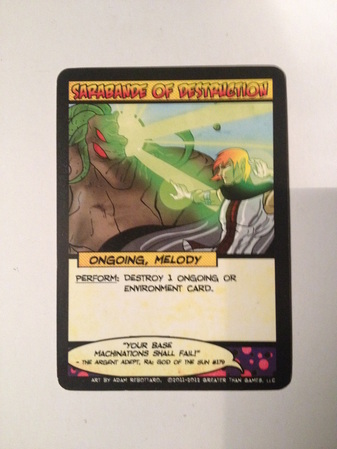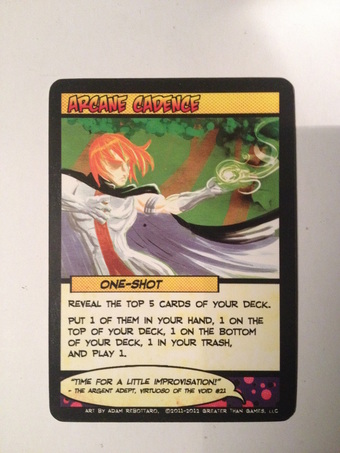So. There it is. In all its box-filling, game-cupboard-hoarding glory. Sentinels of the Multiverse. I should mention that the above picture is the base game and all of the possible expansions. I included it to a) show how truly vast this game has become and 2) because I think the way the boxes deal with expansions is the coolest thing since sliced cards. Yes kids, did you know that? We used to have to slice our own decks of cards. They were made like loaves, and if you sliced them too thick, you just didn't have an Ace of Hearts that time around, I guess.
No no, this picture is of the Sentinels of the Multiverse base game with no expansions.
See, much less impressive. I had to decide whether to review the base set or the whole expanded universe (or multiverse, I guess), and I finally settled on reviewing the game with the expansions together, because I feel that the game itself is not changed by the expansion, it remains the same game just with... more game? More cards? Right! On with the review!
Sentinels is a game in which each player chooses a super hero they wish to be and you form a team to take down one villain. You each receive a deck that corresponds to your hero. There is a Legacy deck, a Wraith deck. Each hero's deck is unique. Then, you select what villain you would like to fight. These villains go across a glorious spectrum of origins and cliches, from a diseased rat-man to a sentient robot factory to a time traveling pirate. The villain has his/her/its own deck that will be playing autonomously, which means controlled by an automobile. But Sentinels doesn't stop with just that. Ha! Five measly decks in play at once, says Sentinels? Child's play. Let's add another! Enter the environment deck. Yes, you will also have a deck played by an automobile for the location in which your heroes will be fighting the villain. These can range from the Ruins of Atlantis, to a normal bustling city-burg-ville, to a rip in the space-time-continuum. So if you have four people playing the game, that will be a total of six decks on the table. So it's not so much a deck builder game, as it is a deck-collector game. He who has the most decks wins! Actually, heroes and villains have hit points, and the first to reduce the other team to 0 is the winner.
Right off the bat, you can see the major appeal that has gained Sentinels massive praise. Basically, this is a game where you play the Not Avengers (because they're copyrighted) with Not Batman, Not Hulk, and Definitely Not Superman (but he's kinda like Superman). It's very easy to get people interested and hooked into this game, because you just have to ask them who their favorite super hero is, and you will more than likely find someone very similar to or in some sad instances
exactly the same as their favorite super hero. I'm looking at you Wraith, who is definitely not Batman. I mean, come on, Wraith is a girl! No way she could be Batman... never mind that she is the CEO of a huge company by day, her boyfriend (not her parents) was killed by criminals or the fact that she sunk billions of dollars into martial arts training and uses a large assortment of gadgets including a utility belt. There's really no way to compare her to Batman. It's just ludicrous.
You and your Not Avenger pals will be fighting the villain and oftentimes the environment as you draw cards to replenish your hand, and you play cards to do... heroey stuff. This stuff falls into three basic categories:
1) Deal damage
B) Buff yourself or allies
+) Debuff the enemy
But more often than not you'll just be dealing damage. And to me that's ok. I know some criticize the game for appearing to be complex with all its decks and cards but actually being a shallow game underneath but, though it is not without its faults that I will most definitely not let slip away unnoticed, I disagree wholeheartedly. Or at least three-quarters-heartedly. I understand why they may feel that way, but I still disagree.
First off, and this cannot be simply brushed aside as if it were the garnish on a 5 star meal, only to be looked at and not devoured, is the sheer variety of heroes, villains, and environments. I recently received the entire Sentinels library (minus a few promotional decks) and I have 26 heroes, 28 villains, and 18 environments. As you (usually) only fight one villain at a time, that is 28 different games you could have just by fighting a different villain, not to mention fighting them in a different environment, not to double mention fighting them with a different composition of heroes. I would rather sit on a cactus than mention the over-used phrase "It's different every time" but... oh... Too late I guess. Well, I'll be right back.
Alrighty, two sore cheeks and one comfy pillow later... Each deck in Sentinels is unique and flavorful though some, especially in the expansion decks, are more colorful than others as Greater Than Games (GTG) seem to have discovered that interesting mechanics should drive their decks as opposed to just different amounts of damage or buffing. The base game, though fun, is a bit lacking in flair. It's not bad, it just seems that the decks are either really good at dealing damage, really good at defending allies, or really good at messing with the enemy, and the cards in each deck, though themed well for the heroes they are portraying, sometimes feel as though they could be given to any hero, had a few words changed around, like change Fire damage to Cold damage, and it would work for any of the other heroes. The heroes could be interchangeable. Not so in the expansions.
It seems GTG figured out that people wanted a bit more uniqueness to the heroes. The expansion heroes gained what I would call an overarching theme to their decks. Whereas Legacy (one of the original heroes) simply flies around dealing damage, blocking damage, other Not Supermany things, Expatriette equips guns, fills those guns with different types of ammo, and then unloads those projectiles on her opponents. ChronoRanger makes use of Bounty cards that he places on his enemies. The Naturalist changes forms to a gazelle, a rhinoceros, or a crocodile, each of which determines the function of a card he just played. But, some people may still cry, each of their decks still only does one thing: Expatriette just relies on guns, Unity only uses her tech-golems, Wraith only does Not Batman stuff. Well, sure there is an argument to be made for that. But, even if each deck has one main idea behind it, even if each deck is a sort of one-trick deck pony... that's 26 one-trick ponies just from the heroes alone. I don't know of many games that can claim to have that many different tricks. Or ponies. Or both/either.
What's also fantastic is that these decks, the heroes, villains, and environments, all work together to create a tense, close game, almost every time. There are rare exceptions where one side will run away with the game, but for the most part when I have played the game has come down to the wire, with our heroes either eeking out a victory by the skin of their teeth, two of their comrades lying unconscious on the sidelines, or the villain narrowly escaping defeat with just a few hit points left. There are times where the heroes will mesh so well, their strategies and cards coming together so perfectly, that an absolutely insane turn happens, and that's magical. One game I was playing with a group of friends saw Tachyon (Not Flash) deal 40 damage in one turn to the main villain. That was half of her health! It was incredible, and it was because that was what the player had been waiting for the entire game. He had been playing his hand for that specific purpose, and by golly it was amazing to behold. So even if you steamroll the villain, it feels as though it is justified due in small part to the luck of the cards, but in most part due to you managing the hand you are dealt with skill. That being said, it is extremely frustrating when the villain does that very same thing back to you, what he/she/it is supposed to do, which is screw you over. Which will happen. A lot.
Remember that game I was just talking about, in which my friend dropped the main villain by half of her hit points in one go? Soon after that massive hit, the villain did what's called "Flipping." It's a wonderful mechanic for the villains in that when certain criteria are met, the villain assumes a different form with different rules regarding their character. Sort of like Frieza or Cell but for card games. Anyway, her flip meant that she was invulnerable until enough of her minions were back out in play. Ok, we thought, we will use this down time to bolster our equipment cards, add some bonuses to ourselves, and when she becomes vulnerable again, we'll take her down. Well, we planned all these things out perfectly, a bonus here, some equipment there, and then the environment played out some cards that meant we couldn't deal damage. And then another that meant we couldn't play cards. And then the villain played a card that wiped out EVERY SINGLE EQUIPMENT CARD AND BUFF CARD WE HAD ON THE TABLE. All that planning, all that hard work, for nothing. She proceeded to defeat us. Soundly. Even after that 40 damage attack, we still lost. And it was because of a really really REALLY lucky draw on her part. So why is it justified when we unleash card combo hell on her but not vice versa? Well, that is because our amazing turn was due to planning and strategy and hers was due to dumb luck. But in the end, I still had fun, and my friends did too. Why?
Because though this game is a win/lose type of a game, the reason I find it compelling is because it tells a story. A story of heroes struggling against a villain whose deck is designed to work in a very specific way (hint: that villain's deck is meant to watch you build up a vast array of equipment only to dash it to pieces), of heroes battling against seemingly overwhelming odds and, truth be told, sometimes failing. It's something seen in most super hero movies today, in fact it is almost a key ingredient in them: the heroes must fall short at some point, get their collective costumed colons beaten soundly, only to have them surge back later in the film, invigorated by their defeat and wizened by their failure. This game tells a story with every card you play, with every card you encounter, and with every villain you face. And that is why this game will always have a home on my shelf, because I am a sucker for stories.
The way in which the game handles theme greatly encourages this idea of story. Each hero's portrait looks like it was an actual comic book cover. Each card has subtext, a quote from an imagined comic book in which the hero may have used the power on the card. Each and every card oozes with beautiful comic book art... except when it doesn't. In a bizarre twist I can only describe as artistic inspiration (question mark?) the art on the cards varies not only in quality but in style as well even when drawn by the same artist which, though a minor issue, does create for some jarring moments that take you out of that story you are creating.
Again, not a game killer, but definitely noticeable. Another not game killer but something that may turn people off is the amount of mathemagics you will have to use. It's a proven fact, the more math a game has, the more likely it is to be torn apart and used as kindling. And this game will see you adding damage, reducing damage, halving damage, taking damage out for a nice Sunday dinner only to leave it crying on the front porch... A turn in Sentinels could look something like this:
Not Aquaman: "Alright, I'm dealing three damage to Baron Blade, which is reduced by two thanks to his shield, but it increased by one because of Legacy's super power which somehow makes me stronger, and it is all changed to fire damage by Ra, and all fire damage is increased by one. Ah, but the environment card in play there means that all characters with the letter "U" in their name must shout out there attack before playing it to get an extra point of damage. But because..."
And it can go on and on as you check all the cards for any additions or subtractions you may have missed. This is a game where it will go a long way having someone very familiar with the cards to sort of keep track of all of them. Which isn't impossible to do, but may need to be done very thoroughly, which may detract from the fun for some.
The point of contention I am about to mention (ha! contention, mention...that was not even my intention... ha again!) only came to me recently, and I'm not sure what to make of it. The best way I can describe it is that it bothers me.
The game box says to play the game with 3-5 players. I'm a rebel, so I usually play with two players, in fact most of my experience with the game has come from just my wife and I playing two heroes apiece. And one game we played just recently in which I played Argent Adept (see artwork above) a support character who uses music as the base for his powers (he's the bard) and Nightmist, a character whose power is based on a chaotic magic, opened my eyes to an issue many people may need to face when it comes to playing Sentinels. This particular game, Argent Adept gained a power that let him destroy any environment card once per turn. The environment deck will draw one card per turn as well, and this environment was a hard hitting one called Enclave of the Endlings. Basically every card was some sort of evil creature that would dish out damage, and they were tough to get rid of. So I used the power of Argent Adept to, every turn, destroy one environment card, which was more efficient than destroying the cards by dealing enough damage. And once the game was over, I realized that was basically all Argent Adept did the entire game. I was not annoyed by this while playing because I had another hero, Nightmist, who was dishing out damage and doing other things. But. BUT. If I had only been playing Argent Adept, if that game had been played by four players, each player controlling one hero, instead of being played by two players, each controlling two heroes, the player using Argent Adept would have had a really boring game. "Yup, I destroy an environment card. Oh look, another one took its place. Don't worry guys, I'll take care of it with my next turn. No really, I love my job." I could understand that being extremely frustrating and off-putting for a lot of people, and it frankly frustrates me that I never noticed it until just recently.
Should that deter you from buying the game? No, because moments like that will be few and far between and though I think the game works better with fewer players even so much as to say two, I wouldn't say it's necessarily more fun with less players, because again this is a story you are crafting, and having more people with you molding and shaping that story and adding input to that story makes it more varied and fun and engaging. And even if you are Argent Adept simply holding down the fort, keeping the nasty environment at bay, there's a satisfaction there of doing your job and doing it well. You are the hero Sentinels needs right now, but not the one it deserves or that might be the most flashy. Wow, I butchered that quote. Why so incompetent?
2 To 4 Players gives Sentinels of the Multiverse 8/10 Not Batarangs.




 RSS Feed
RSS Feed
